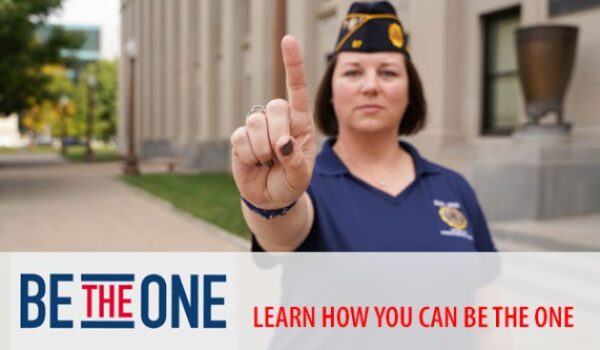This week is Suicide Awareness Week
- David Rudd, a veteran and professor of psychology at the University of Memphis, told Newsweekthat suicide “is the single most significant health concern among veterans today.”
“If you go back to the Vietnam war, the most significant health concern at the time was Agent Orange. Now it’s suicide.”
According to official data, over 30,000 veterans have died by suicide between September 2001 and 2019—four times more than the number of those who died in combat in Iraq and Afghanistan.
The stigma stings most Veterans today.
The American Legion recently launched its Be The One campaign to encourage American Legion Family members, veterans, servicemembers and others to take action when they believe a veteran is at risk of suicide.
Here are some answers to common questions about this new initiative:
Question: How did the “Be The One” initiative develop?
Answer: The American Legion, the nation’s largest veterans service organization with more than 1.8 million members, is guided by its Four Pillars. Among those is the Veterans Affairs & Rehabilitation pillar. At its core, the Legion’s mission is to enhance the well-being of America’s veterans, their families, our military and our communities by their devotion to mutual helpfulness.
Question: Why is this a priority right now?
Answer: Today, the No. 1 issue facing those who served is veteran suicide, according to the National Veteran Suicide Prevention Annual Report. Each day, no fewer than 17 veterans die by suicide. That’s more than 6,000 each year. The rate of suicide for veterans is more than 50% higher than that of non-veteran adults. As the Global War on Terrorism continues, there will be more veterans facing mental-health issues such as post-traumatic stress disorder.
Question: What will the Be The One campaign achieve?
Answer: At its core, The American Legion is activating a national platform to end veteran suicide. The Be the One campaign will:
- Destigmatize asking for mental health support, creating opportunity for those with mental health issues to speak freely and get the support they need.
- Provide peer-to-peer support and resources in local communities.
- Deploy FDA-approved therapeutics for veterans to identify issues and find resources for support.
Question: I’m not a veteran. How can I support this program?
Answer: The stigma associated with mental health issues is a barrier to veterans seeking assistance. They fear loss of their job, think they can handle their situation themselves, or don’t think others can understand their situation. Family members may be the first to recognize the signs that their loved one needs help, but they may lack the knowledge of how to approach the situation. If you have a family member who is a veteran, The American Legion encourages you to Be the One to:
- Ask veterans in your life how they are doing.
- Listen when a veteran needs to talk.
- Reach out when a veteran is struggling.
- Pledge to Be the One at betheone.orgby signing up for email updates.
Question: I’m a veteran. What should I do to help this program succeed?
Answer: While this program is designed to help all veterans, we know that everyone responds differently to stresses, have different life experiences and have varying results in types of treatment. However, the following are guidelines intended to provide help before a crisis situation develops. The American Legion encourages you to Be the One to:
- Talk with others about how you are feeling.
- Ask for help when you know you need it.
- Know there are millions of people ready to help you.
- Remember your family and friend’s care.
John Hacker
John E. Jacobs American Legion
Suicide Awareness Community Team
Leland, North Carolina 28451
910-209-0770
